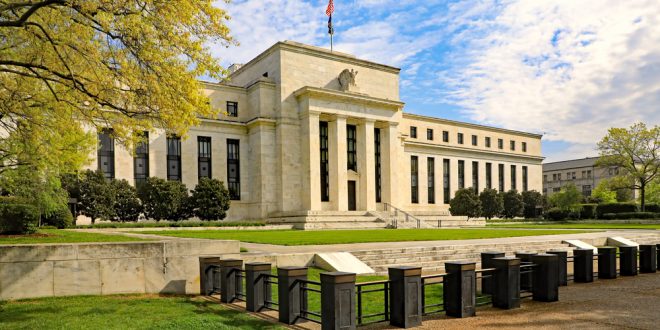The Kansas City Fed announced it would host its 2021 Economic Policy Symposium, “Macroeconomic Policy in an Uneven Economy,” virtually on Friday, Aug. 27.
The Federal Reserve Bank of Kansas City’s Economic Policy Symposium in Jackson Hole, Wyo., is one of the longest-standing central banking conferences in the world. The event brings together economists, financial market participants, academics, U.S. government representatives, and news media to discuss long-term policy issues of mutual concern.
Jerome Powell is expected to try to balance the forces that have become more complex since the last Fed officials meeting.
In his speech, he is expected to address the challenges of recovering from the Corona pandemic, especially with the risks of spreading the delta mutated. Still, the primary attention will focus on the normalization of monetary policy of the Federal Reserve after the minutes of the July meeting revealed the bias of the majority of economic policymakers to start tapering before the end of this year. The step tapering, which is widely expected to take place during the last quarter of 2021 or the first quarter of 2022, comes for the Federal Reserve to announce the start of the easing policies that it announced at the beginning of the pandemic by increasing purchases of treasury bonds and mortgage-backed securities and reducing rates to a level near Zero.
On the other hand, some analysts expect Powell to give a softer tone and stress that the FOMC decision at the end of September will be based only on data and forecasts available at this time to leave the door open for later tapering.
Powell promises that monetary easing and stimulus policies will recover employment, similar to what the United States witnessed after the global financial crisis.
The Fed is currently focusing on restoring full employment, aiming to reduce unemployment rates while tolerating the significant rise in the inflation rate. However, the minutes of the Fed meeting showed that it had become a source of concern among Fed members with fears that it will remain above the 2% target for longer than expected.
Initial jobless claims were steady at 353k, a modest increase from the 349k last week, while the second reading for GDP in Q2 showed the US economy grew by 6.6%.
All times are U.S. Eastern:
Following is the agenda for Friday’s Jackson Hole Economic Policy Symposium.
Agenda
Aug. 27, 2021
9:00 a.m. – 12:00 p.m.
Morning Session
Chair:
Janice Eberly
Professor
Northwestern University
9:00 a.m.
Welcome and Opening Remarks
Speakers:
Esther L. George
President and Chief Executive Officer
Federal Reserve Bank of Kansas City
Jerome H. Powell
Chair
Board of Governors of the Federal Reserve System
9:30 a.m.
Monetary Policy and Uneven Shocks
Author:
Veronica Guerrieri
Professor
University of Chicago
Discussant:
Jing Cynthia Wu
Associate Professor
University of Notre Dame
9:55 a.m.
General Discussion
10:15 a.m.
Fiscal Policy and Uneven Shocks
Author:
Pierre-Olivier Gourinchas
Professor
University of California – Berkeley
Discussant:
Valerie Ramey
Professor
University of California – San Diego
10:40 a.m.
General Discussion
11:00 a.m.
The Interaction of Fiscal and Monetary Policy
Panelists:
Alan Blinder
Professor
Princeton University
Gita Gopinath
Economic Counsellor and Director of the Research Department
International Monetary Fund
Eric Leeper
Professor
University of Virginia
11:45 a.m.
General Discussion
12:00 p.m.
Adjournment of Morning Session
1:00 p.m. – 4:00 p.m.
Afternoon Session
Chair:
Lisa D. Cook
Professor
Michigan State University
1:00 p.m.
Remarks
Speaker:
Donald Kohn
Senior Fellow
Brookings Institution
1:30 p.m.
The Covid Shock and an Uneven Labor Market
Author:
Ayşegül Şahin
Professor
University of Texas – Austin
Discussant:
Betsey Stevenson
Professor
University of Michigan
1:55 p.m.
General Discussion
2:15 p.m.
Low Interest Rates and an Uneven Economy
Author:
Amir Sufi
Professor
University of Chicago
Discussant:
Fatih Guvenen
Professor
University of Minnesota
2:40 p.m.
General Discussion
3:00 p.m.
Monetary Policy in an Uneven Economy
Panelists:
Markus Brunnermeier
Professor
Princeton University
Kristin Forbes
Professor
Massachusetts Institute of Technology
Maurice Obstfeld
Professor
University of California – Berkeley
3:45 p.m.
General Discussion
4:00 p.m.
Adjournment of Afternoon Session
 Noor Trends News, Technical Analysis, Educational Tools and Recommendations
Noor Trends News, Technical Analysis, Educational Tools and Recommendations





